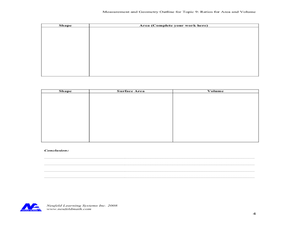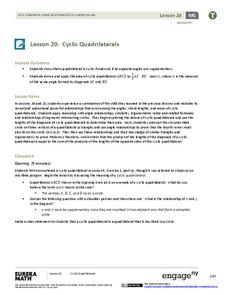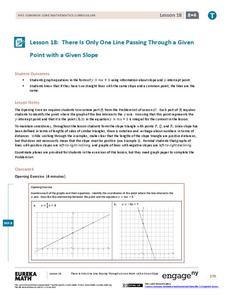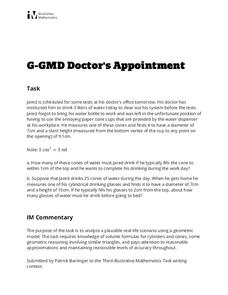Curated OER
Hoops: Grade 4 and 5
4th-5th graders will compete in a game similar to Jeopardy in which they answer questions from a variety of subject areas including science, language, and math. The questions are based on an extremely wide variety of topics, so would be...
Curated OER
Pythagoras' Theorem
In this Pythagorean Theorem instructional activity, students use the Pythagorean Theorem to determine the length of a missing side. They calculate surface area of a prism. This two-page instructional activity contains 4 multi-step problems.
Curated OER
ndirect Measurement Technique: Using Trigonometric Ratios
Ninth graders find the height of an object that would be difficult or impossible to measure directly. They construct and use a Clinometer to measure the angle of elevation (or depression). Students create a sketch of the measurement...
Alabama Learning Exchange
Trapezoids: What's Equal or Right About Them?
Pupils explore the concept of trapezoids. In this trapezoids instructional activity, students identify legs and bases of a trapezoid. Pupils discuss the similarities and differences between isosceles trapezoids and right...
Curated OER
Hexagoning the Circle
Students explore similarity to see that the area of a circle should be a constant times the square of its radius. Students create a hexagon. Students share their designs with the class.
Curated OER
Mirror Wells
Students study mirror wells, which are similar to 3-D kalediscopes, but the end is cut off to enable you to look at patterns through them.
Curated OER
One-Difference Classification Train
Students practice their classification skills through hands-on practice. Working in groups, students identify various ways in which similar items can be classified. Given a kit of similar items, students classify objects in multiples...
Curated OER
Fences and Posts
Fifth graders use Geoboards to demonstrate how shapes can be made by looping the rubber bands over the nails. They make a triangle on their Geoboards. At least one side of the triangle should be either horizontal or vertical. The picture...
Curated OER
Measuring Angles
Third graders describe an amount of turn from a particular position to another using the 'circular' benchmarks of 0, ++, ++, ++, and full turn. Estimation language such as 'just about', 'between', 'not quite', 'just over', and similar...
Curated OER
Seeing Shapes
Students discover different geometric shapes such as triangle, square, rectangle, and octagon. Students incorporate the use of technology by taking pictures of shapes around their school using a digital camera.
Curated OER
Equality: Children's Rights
Students and parents participate in a variety of activities designed to help them explore the similarities and differences of people. They design and wear masks, sort attribute blocks, read stories, discuss the rights and...
Curated OER
Spider Webs
Students create spider webs. In this spider webs instructional activity, students research various types of spider webs then write a report about a spider of their choice. Students also make their own web similar to an orb...
Curated OER
Properties of Fractals
Students build a working definition of a regular fractal, they measure the concepts of dimensions and scale, they explore the concept of a logarithm and they attempt to solve simple exponential equations for the exponent both by trial...
Virginia Department of Education
High School Mathematics Geometry Vocabulary Word Wall Cards
Having a good working knowledge of math vocabulary is especially important for geometry learners. Here are 119 pages worth of wonderfully constructed definitions, constructions, formulas, properties, theorems, and postulates. This is a...
Curated OER
Ratios for Area and Volume
In this ratios for area and volume worksheet, students solve problems where they find the ratios for problems of shapes dealing with area and volume. Students complete 4 problems.
EngageNY
Criterion for Perpendicularity
The Pythagorean Theorem is a geometry pupil's best friend! Learners explain the equation a1b1 + a2b2 = 0 for perpendicular segments using the Pythagorean Theorem. They are able to identify perpendicular segments using their...
EngageNY
Cyclic Quadrilaterals
What does it mean for a quadrilateral to be cyclic? Mathematicians first learn what it means for a quadrilateral to be cyclic. They then investigate angle measures and area in such a quadrilateral.
Polar Trec
Playground Profiling—Topographic Profile Mapping
The Kuril islands stretch from Japan to Russia, and the ongoing dispute about their jurisdiction prevents many scientific research studies. Scholars learn to create a topographic profile of a specific area around their schools. Then they...
EngageNY
There is Only One Line Passing Through a Given Point with a Given Slope
Prove that an equation in slope-intercept form names only one line. At the beginning, the teacher leads the class through a proof that there is only one line passing through a given point with a given slope using contradiction. The 19th...
Illustrative Mathematics
Doctor's Appointment
Geometric volume calculations are brought into the real world in a quick set of application problems. Learners are asked to help a patient figure out how to drink a prescribed amount of water both at work and at home. This activity...
Charleston School District
Review Unit 4: Linear Functions
It's time to show what they know! An assessment review concludes a five-part series about linear functions. It covers all concepts featured throughout the unit, including linear equations, graphs, tables, and problem solving.
Kenan Fellows
Math Made Simple as 1-2-3: Simplified Educational Approach to Algebra
Writing an equation of a line is as easy as m and b. A lesson presentation gives individuals different strategies for writing equations of lines. Some items provide a slope and a point while others provide two points. Whatever the given,...
Curated OER
Ruler and Compass Constructions
Fourth and fifth graders examine how to construct perpendicular lines and to bisect angles using rulers and compasses in this unit of lessons. They design a number of polygons using these methods.
Curated OER
Tangrams
Students construct tangram pieces. Then they make observations and explore patterns with the pieces.
Other popular searches
- Pairs of Similar Triangles
- Geometry Similar Triangles
- Similar Triangles Ratios
- Proving Similar Triangles
- Similar Triangles Worksheet
- Similar Triangles Height
- Similar Triangles Proportions
- Similar Triangles Sas
- Similar Triangles Types
- Similar Triangles Ramps
- Triangles Similar
- Similar Triangles Sase

























